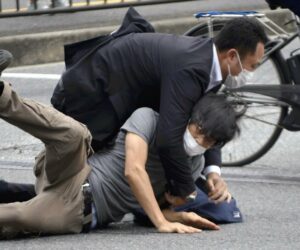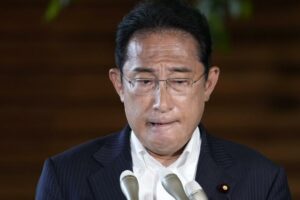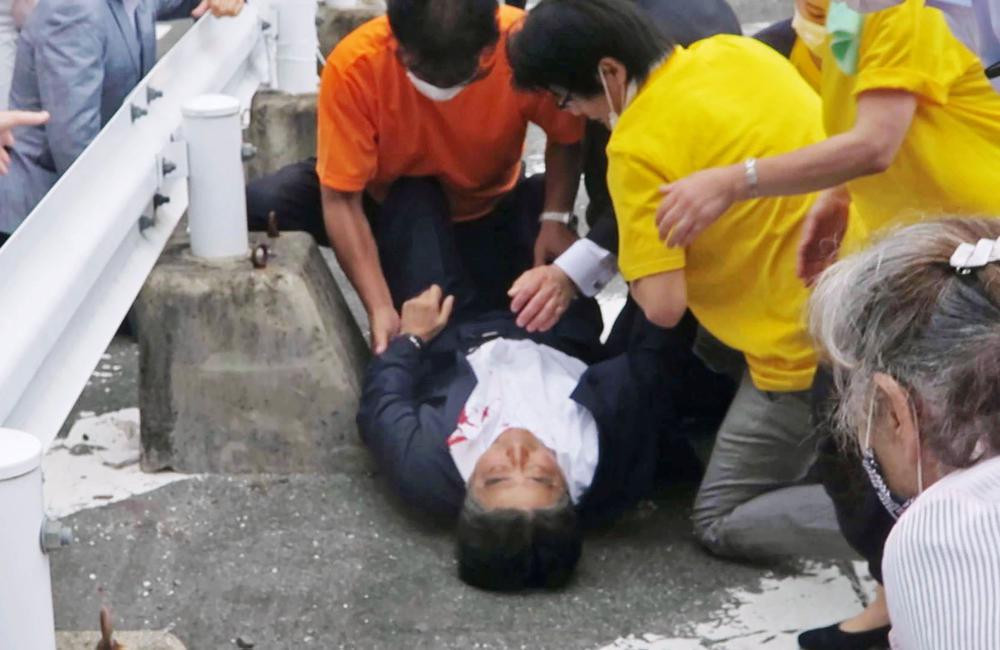Former Japanese Prime Minister Shinzo Abe, a divisive arch-conservative and one of his nation’s most powerful and influential figures, has died after being shot during a campaign speech Friday in western Japan, hospital officials said.
Abe, 67, was shot from behind minutes after he started his speech in Nara. He was airlifted to a hospital for emergency treatment but was not breathing and his heart had stopped. He was later pronounced dead despite emergency treatment that included massive blood transfusions, hospital officials said.
Police arrested the suspected gunman at the scene of an attack that shocked many in Japan, which is one of the world’s safest nations and has some of the strictest gun control laws anywhere.
Prime Minister Fumio Kishida and his Cabinet ministers hastily returned to Tokyo from campaign events around the country after the shooting, which he called “dastardly and barbaric.”
Nara Medical University emergency department chief Hidetada Fukushima said Abe suffered major damage to his heart in addition to two neck wounds that damaged an artery, causing extensive bleeding. He was in a state of cardio and pulmonary arrest when he arrived at the hospital and never regained his vital signs, Fukushima said.
Abe was Japan’s longest-serving leader before stepping down in 2020.
Public television NHK aired a dramatic video of Abe giving a speech outside a train station in the western city of Nara. He is standing, dressed in a navy blue suit, raising his fist, when two gunshots are heard. The video then shows Abe collapsed on the street, with security guards running toward him. He holds his chest, his shirt smeared with blood.
In the next moment, security guards leap on top of a man in gray shirt who lies face down on the pavement. A double-barreled device that appeared to be a handmade gun is seen on the ground.
NHK public broadcaster aired footage showing Abe collapsed on the street, with several security guards running toward him, He was reportedly shot a few minutes after he started talking outside of a main train station in western Nara.
Nara prefectural police confirmed the arrest of Tetsuya Yamagami, 41, on suspicion of attempted murder. NHK reported that the suspect served in the Maritime Self-Defense Force for three years in the 2000s.

Other videos from the scene showed campaign officials surrounding Abe. The former leader was still highly influential in the governing Liberal Democratic Party and headed its largest faction, Seiwakai. Elections for Japan’s upper house, the less powerful chamber of its parliament, are Sunday.
“I use the harshest words to condemn (the act),” Kishida said as he struggled to control his emotions. He said the government planned to review the security situation, but added that Abe had the highest protection.

Opposition leaders condemned the attack as a challenge to Japan’s democracy. In Tokyo, people stopped on the street to grab extra editions of newspapers or watch TV coverage of the shooting.
When he resigned as prime minister, Abe said he had a recurrence of the ulcerative colitis he’d had since he was a teenager.
He told reporters at the time that it was “gut wrenching” to leave many of his goals unfinished. He spoke of his failure to resolve the issue of Japanese abducted years ago by North Korea, a territorial dispute with Russia and a revision of Japan’s war-renouncing constitution.
That last goal was a big reason he was such a divisive figure.
His ultra-nationalism riled the Koreas and China, and his push to create what he saw as a more normal defense posture angered many Japanese. Abe failed to achieve his cherished goal of formally rewriting the U.S.-drafted pacifist constitution because of poor public support.
Loyalists said that his legacy was a stronger U.S.-Japan relationship that was meant to bolster Japan’s defense capability. But Abe made enemies by forcing his defense goals and other contentious issues through parliament, despite strong public opposition.
Abe was a political blue blood who was groomed to follow in the footsteps of his grandfather, former Prime Minister Nobusuke Kishi. His political rhetoric often focused on making Japan a “normal” and “beautiful” nation with a stronger military and bigger role in international affairs.
Many foreign officials expressed shock over the shooting.
Abe said he was proud of working while leader for a stronger Japan-U.S. security alliance and shepherding the first visit by a serving U.S. president to the atom-bombed city of Hiroshima. He also helped Tokyo gain the right to host the 2020 Olympics by pledging that a disaster at the Fukushima nuclear plant was “under control” when it was not.
Abe became Japan’s youngest prime minister in 2006, at age 52, but his overly nationalistic first stint abruptly ended a year later, also because of his health.
The end of Abe’s scandal-laden first stint as prime minister was the beginning of six years of annual leadership change, remembered as an era of “revolving door” politics that lacked stability and long-term policies.
When he returned to office in 2012, Abe vowed to revitalize the nation and get its economy out of its deflationary doldrums with his “Abenomics” formula, which combines fiscal stimulus, monetary easing and structural reforms.
He won six national elections and built a rock-solid grip on power, bolstering Japan’s defense role and capability and its security alliance with the U.S. He also stepped up patriotic education at schools and raised Japan’s international profile.
(AP)












10 Responses
this can start a world war….everyone is watching so many countries yet Japan is sitting and waiting to show their hands and arms……this was an awful breach of humanity
That’s for Pearl Harbor!
He’s no longer feared dead…
maybe change the headline to “assassinated”?
I pray for this man’s soul and for those who criminally wanted to silence goodness well I hope Hashem deals not so kindly with you and all that are trying to hurt Israel and Jews around the world…..
“Former Japanese Prime Minister Shinzo Abe, a divisive arch-conservative” ?! Really, YWN? How disgustingly low can you get? This is AP’s vile, disgusting, hate-filled, communist poison, but you chose to republish it.
Compare to AP’s reports when those pieces of filth, Hugo Chavez and Fidel Castro, finally took their one-way trips to Hell. “Hugo Chavez, fiery Venezuelan leader, dies at 58”. “Fidel Castro, who defied US for 50 years, dies at 90 in Cuba”. Not a word about what monsters they were, not even a mention that they were not exactly uniting. But now a decent world leader dies and he’s a “divisive arch-conservative”?! “Divisive”?! He was the longest serving Japanese PM since WW2 — reelected twice in landslides — how is that “divisive”? Feh. You should be ashamed.
ok
@Yaapchik YOU are not clever nor amusing. This was a fine man who was pro Israel and pro Jewish.
Sara Rirka. The only ones hurting the Jews are the Jews themselves.
The Sinat Hinam and separation is the problem. Not the outside world
Why hasn’t sleepy joe already boarded the aeroplane, to head out to the funeral.
It is an absolute disgrace that sleepy joe isn’t paying full respect.
“divisive arch-conservative”??
who’s writing your copy, YWN? Kamala Harris? susan rice?